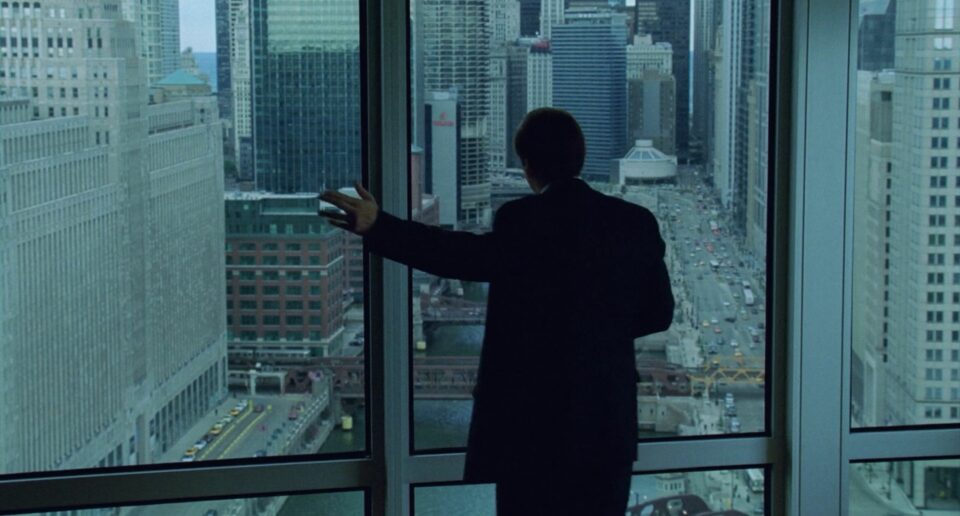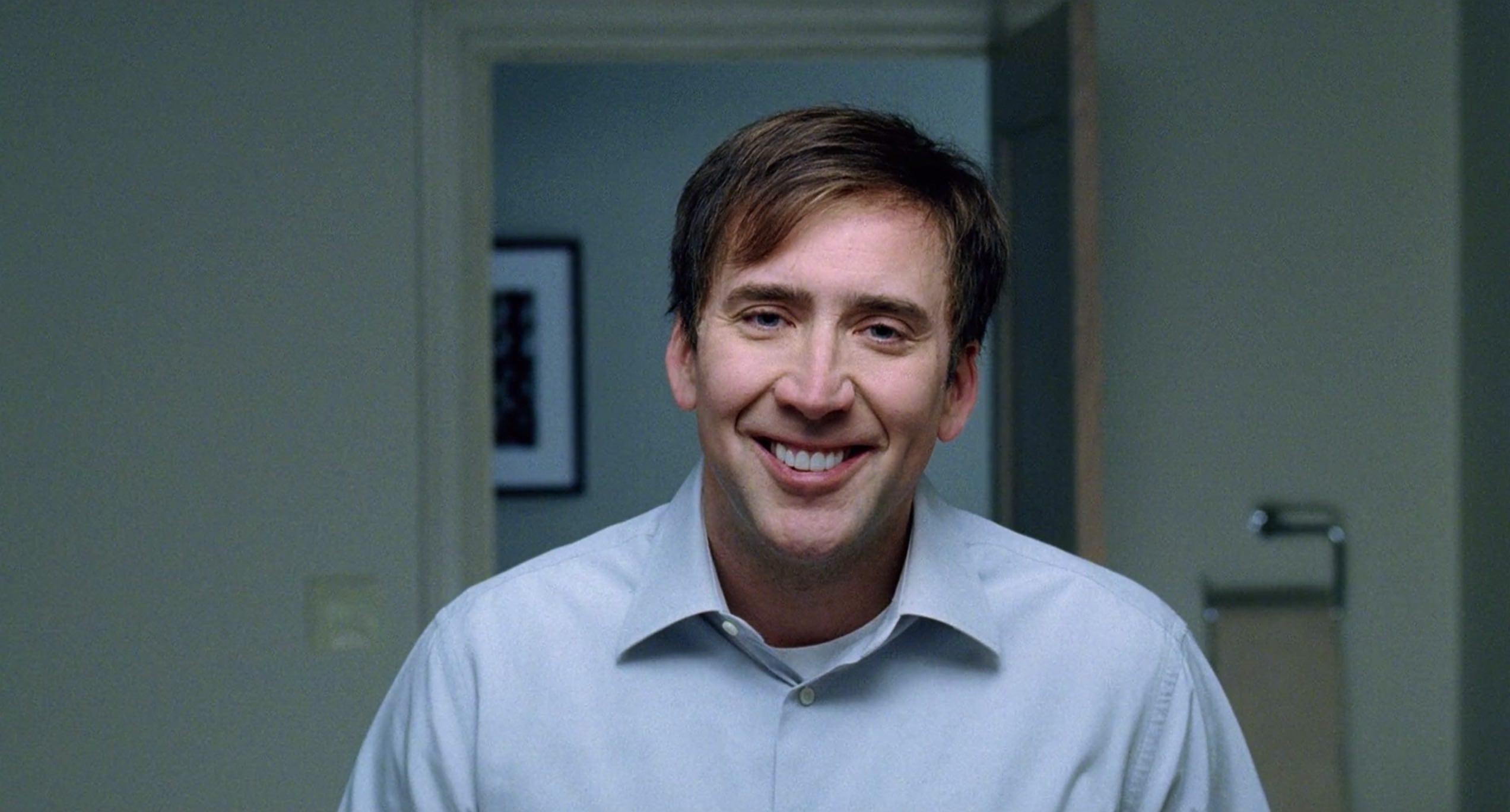With many of us brushing off the disappointment this week that Chris McKay’s cartoonish vampire comedy Renfield wasn’t quite the invitation for Nicolas Cage to go full Loew it could have been, the film got me thinking about another notable movie in the actor’s ever-ballooning filmography. Somewhere in that stretch of the early 2000s when Cage inexplicably starred as a titular man in every “Man”-titled movie (The Family Man, Matchstick Men; though, sadly, never Superman)—when not starring as the man being burned alive inside of the titular man—he was first paired with his Renfield co-star Nicholas Hoult in a very different kind of weird Nic Cage movie than the more typically gonzo role he knocked out of the park in Vampire’s Kiss. I’m referring, of course, to The Weather Man: Gore Verbinski’s tale of an extremely divorced Chicago meteorologist hopelessly trying to reboot his marriage, and who may or may not deserve to have a Frosty thrown at him now and again.
Before we go any further, it’s hard to say in retrospect whether this movie feels more eerily mild within the context of its director’s name making him sound like he fronts a Polish death metal outfit (he actually played in several LA punk bands before pivoting to directing music videos for them) or within the context of the fact that Verbinski used the project to cleanse his palate between helming the first two Pirates of the Caribbean movies. Far from a blockbuster epic adapted from an amusement park ride finally permitting Johnny Depp to begin his regrettable second act pivot from “art-film heartthrob” to “inebriated hard rocker caricature,” The Weather Man fell into that short-lived era of Hollywood faux-indie midlife crisis movie likely wrought by American Beauty, pairing Cage and Hoult in a fragile father/son dynamic constantly offset by age-inappropriate situations encountered by the young Hoult nearly as frequently as it is offset by age-inappropriate behavior exhibited by the old-enough-to-know-better Cage. The adults in this movie seem to want to be kids, while the kids seem to want to be adults.
While the movie’s marketing materials really hammered home its sadboy Jungle 2 Jungle imagery, what’s really at its center is the timeless issue of humans refusing to act their age. In one scene Hoult’s preteen sister—bullied for a certain colloquial wardrobe malfunction—puffs a cig and calls her classmates “cunts”; in others, Cage earnestly obsesses over “BJ enthusiasm” or the potential costs and benefits of having two dicks. It seems like the only unifying behavior that adheres any of the generations depicted in this movie (which also includes Cage’s dad’s generation, with an ever-unreadable—if not totally alien—Michael Caine judgmentally overseeing his son’s family rapidly deteriorate) is a uniform sense of broaching subjects too taboo to bring up in a mainstream American movie. There’s a significant pedophilia subplot, for one thing; for another, most of the movie we get the impression that Cage’s family feels no love for him whatsoever. Actually the only character here who does act his age, and who does exactly what a wide audience wants him to do as a person of this age, is Hoult, who gets busted for smoking pot and attacking his sexual predator guidance counselor.
The adults in this movie seem to want to be kids, while the kids seem to want to be adults.
When this movie first came out, I got stuck on the fact that it really didn’t have much to do with bows and arrows, despite what all of its marketing materials implied, nor was it the dark comedy those materials promised it would be (they really succeeded in packing all the humorous moments into the trailer, which strips them all from context that makes them significantly harder to laugh at). It felt like one of the most notable offenders of a major studio trying to dip its toes in the quirky-indie pool of the Borders era (Hans Zimmer, also breaking from his boisterous work on Pirates, flips back and forth between finicky dialup-era ambient-electronic and...dub?), or at best an uncommitted critique of American life (“That’s a real American accomplishment,” a vaguely accented Caine says to his son in what is the closest thing to a compliment he concedes all movie) dropping around the same time as Thank You for Smoking, Supersize Me, and Lord of War, which all picked up where Michael Moore left off pre-9/11 (it was also deep in the era of voiceover narration, despite Brian Cox demanding we put an end to that a few years prior).

This is all to say that rewatching the movie now, it’s surprising to find how wrong I was about both of those critiques. First off, Cage is hilarious here, and I think he suffers the same fate he did with Vampire’s Kiss in that he’s playing the role for laughs so well that we can’t seem to process the transparent comic elements of the script. The movie is essentially about how frustrating life can be when you’re an idiot—just a completely dumb guy. It depicts a Happy Madison type character chillingly inserted into the very real world (I’ve never seen Chicago so viscerally portrayed in a movie—maybe because it’s the only movie bravely filmed during the sloggiest months of winter) in a way that really feels not only accurate to the behavior of all the idiots in my life, but even in my own behavior when I do something an idiot would do. In the same way this man’s life falls apart because he fails to understand the symbolic significance of tartar sauce in his relationship, I initially overlooked just how much of this movie is about learning to aim at the right targets—say, those which are set up at your daughter’s practice facility versus something you create for yourself and adjust to match your own skill level and adult strength.
The movie is essentially about how frustrating life can be when you’re an idiot—just a completely dumb guy. It depicts a Happy Madison type character chillingly inserted into the very real world.
Yet the majority of the film’s conflict lies within scenes of Cage-as-idiot subverting our expectations and competently taking a step in the right direction toward salvaging his life—that is, until he becomes aware of this self-improvement, or becomes impatient with the relatively slow speed of development, or gets decked with a Big Gulp on the street, and takes two steps back. It really is a bleak movie when you approach it from certain angles. Beyond its existential questions of whether TV personalities equate to the fast food sandwiches that get thrown at them, its ultimate answer to the question of finding a silver bullet to rid yourself of all of your deeply rooted problems wisely eschews “move to a new city” or “find a new job” in favor of “carry an extremely visible weapon everywhere you go.” “Easy doesn’t enter into grown-up life” seems to be the thesis of this story, an assertion almost tauntingly muttered by Caine as we begin to wonder whether he’s at all aware of the Kendall Roy–tier daddy issues at the center of his son’s discontent.
While Hoult didn’t have nearly the star power he does today, he does an incredible job here with what little he’s given (like Caine, he’s probably intentionally meant to feel like little more than a humanoid fixture in Cage’s life). Cage, meanwhile, is at his understated best here, controlling those Loew reflexes while still giving us surreally indelible images like a rough recreation of Nostalghia’s candle walk scene where he dramatically runs down North LaSalle Street in the middle of traffic holding out a McDonald’s hot apple pie he’s just been beaned with as if it’s a religious artifact, suggesting he may finally understand the symbolic value everyday items can have in our lives and in our relationships with other people. FL









